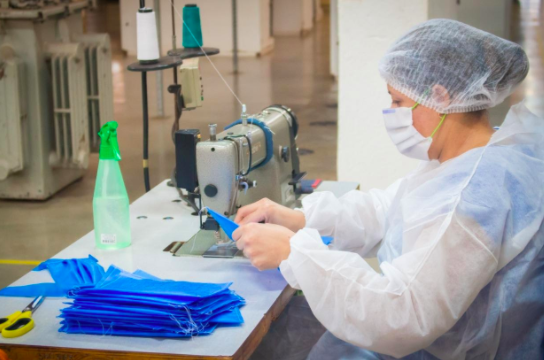
This blog was written by Esa Rintakorpi, Consultant Nurse Acute and Emergency Care
The coronavirus pandemic has been a terrible tragedy across the globe with tens of thousands of deaths. The staff working on the front line in hospitals have been under a new kind of pressure with battling the pandemic whilst, at the same time, worrying about their own and their loved one’s wellbeing. Many have been infected, some have died which has raised anxieties further.
Working as a Consultant Nurse in an Emergency Department, I have noted a positive development of individuals who are stepping up and flourishing. In particular, I have seen some of the nurses working in tandem with the Emergency Department doctors and the intensive care teams really transform professionally.
As critically ill patients arrive in the Emergency Department the nurse dons the personal protective equipment (PPE) and enters the pod cubicle in the resuscitation area of the department. Once in, they cannot come out without doffing the PPE, therefore good planning is essential in order to have everything ready for the initial assessment of the patient. In our department, many of the nurses took up the opportunity to train to do Arterial Blood Gas sampling – a vital part of the COVID-19 patient’s assessment in which levels of oxygen and carbon dioxide in the blood are measured to provide an insight into the patient’s respiratory status. In order to carry out this blood test, the healthcare practitioner must feel for the artery in the wrist, as opposed to taking blood from a visible vein in the arm, which requires practice and dexterity. The patient is often not only unwell but very scared, met by staff wearing masks, gowns, visors, and other equipment. They are put into an environment with no possibility of having any loved ones present and there is very little physical contact with those caring for them due to the highly infectious nature of the virus and the necessary PPE worn.
In this context, the nurses I work with have excelled, they have demonstrated exceptional skill in caring and reassuring the patients. Being able to reassure whilst carrying out all the necessary technical procedures from taking temperatures to performing intravenous cannulation and measuring arterial gases. It is also remarkable that in this care setting the nurses are doing their work but also are working at a high risk to themselves.
Another staff group that has excelled in this crisis is the Advanced Clinical Practitioners (ACPs) in the Emergency Departments. An ACP is a senior nurse or paramedic (or other allied healthcare professional) who has undertaken a clinical Master’s Degree and is working within our department towards a formal accreditation with the Royal College of Emergency Medicine. Within our department, we have six ACPs and their contribution and clinical leadership have been critical to the COVID-19 response. The ACPs have the clinical background of a nurse or paramedic and offer a more multidimensional approach to the patient. The relationship with the multidisciplinary team is also different and the nurse-doctor divide is bridged. The COVID-19 context in which we are all working has expedited the transformation of role-based care towards competency-based seniority where people are no longer defined by their title, but their skill and experience.
We have as a consequence several examples of patients being brought into the Emergency Department resuscitation room with COVID-19 and very unwell. The nursing staff does the initial assessment and the ACP reviews the initial results outside the pod, documenting the findings. The ACP then enters the pod in full PPE and takes additional history if possible, examines the patient, and decides upon initial management such as whether to administer antibiotics, oxygen requirement, and if escalation in care is imminent. X-rays are helpful but it is possible to use point of care ultrasound, however in the main, the clinical picture gives a good initial diagnosis of COVID-19.
Sometimes the decision to escalate treatment is in the balance and that is when senior support is necessary. As the Consultant Nurse, it is my job to provide this senior opinion and together we come to a decision on treatment and onward referral. Some patients will need help with their breathing using a C-PAP device. However, some patients will not get better with this and will need intubation. At this point, the Intensive Care teams come to look after the patient and take them to the intensive care units.
Unfortunately, there is a group of patients where the intubation will not help and a decision about “ceiling of care” must be made. These are difficult and emotive discussions with the patient, it will be even worse for the loved ones who will have to have these discussions over the phone and in some cases without the possibility of seeing their loved one again.
Looking for the positives in this crisis is not always easy. In this case, I have outlined the importance of the skilled nurses and advanced practitioners working alongside the doctors and other staff for the benefit of the patients in exceptional circumstances. They have shown dedication, courage, and leadership. In my view, the emergence of highly skilled nurses at all levels with a wide range of clinical as well as technical skills which allows patients to have a definitive care plan as early on as possible is something we should hold on to and develop further.


